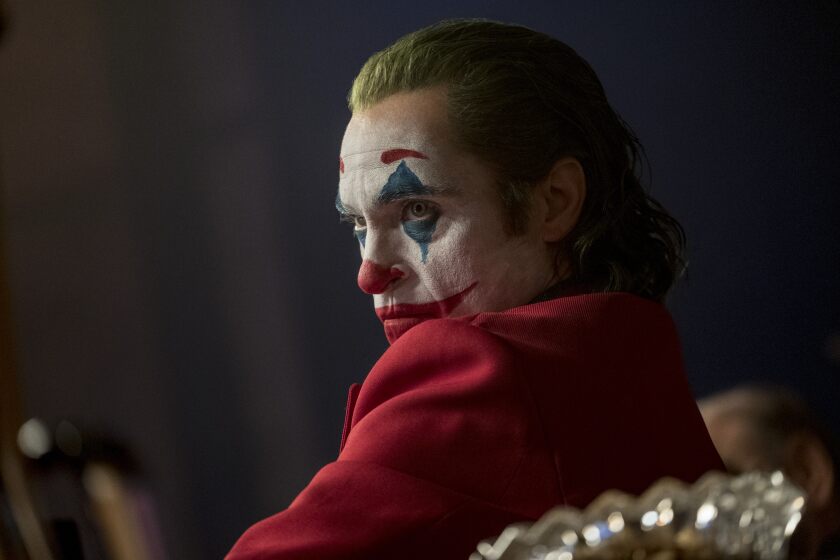Society’s obsession with villains is a long one. They are the flawed and twisted underdogs and unknowns that, when conveyed with the right bravado, end up being the characters that we root for or relate to the most. They are also the characters that we seemingly want more of on our screens. However, due to the nature of the superhero genre, the villains who usually dominate the space they occupy are still narratively regulated to the sideline; we understand these villains must escape from the questioning and complexity that we demand from our leading hero. That narrative changes with Joker, but instead of the deep and dark character study that the public (or at least me) has been begging for, Joker reminds us why villains are better regulated as unknown, unpredictable, and surface-level quantities.
We can’t fault director Todd Phillips for at least trying to create an origin story for the world’s most infamous villain. The effort is clearly there. However, the attempt is so explicit, the film feels like a desperate plea for critical recognition. With its gorgeous set design, blocking, and cinematography, Phillips and cinematographer Lawerence Sher should be applauded for creating shots to help invoke the grittiness and darkness that drapes Gotham. They create a terrifyingly gorgeous visual playground for the Joker to play in. However, the effort placed within these shots is too noticeable, exposing the fundamental problem of the film. Joker is too self-serious and self-important and thus makes the film think its themes are as well. It results in heavy-handed plot devices to ensure we recognize the “brilliance” of the created ideas and a feeling that if we disagree with the vision and execution, we are not at Phillips’s level.
Even the spoon-fed themes of Joker get lost throughout the film due to Phillips’s inability to focus on ideas that blend well within the context of the film. In an origin story, we are invited to the creation and build up to a character’s motives or actions. It was something that Heath Ledger’s Joker purposefully lacked and it made his Joker seem chaotic and unpredictable in a natural way. Ledger never allowed us to be too mentally close with Joker, thus blocking our view into the psyche of the Joker and allowing the unpredictability of his Joker to benefit.

Joaquin Phoenix and Phillips play it differently. Due to the nature of the genre and how Phoenix shapes his Joker entry, we can move closer into the mind of Joker. We get the space to explore the nooks and crannies of a psychotic human because of Phoenix’s astounding and haunting performance. The beginning feels as if we are going to get to do that exploration as we get led down a path of understanding the alienation of the economically disadvantaged. Phillips uses Joker’s situation of a lost job and social welfare, combined with a maternal figure who dreams of the rich helping the poor to lead the way. He then contrasts this with the hypocritical proclamations made by the ‘Trumpian’ Thomas Wayne and the Wall Street bullies who infest the city.
However, rather than narrowing our field of vision of Joker’s mind to allow us to dive into the nuances that make him the complicated figure modern society has deemed him to be, the film loses itself in Joker’s inherent psychotic and maddening power and starts rapidly spitting a whole array of shallow reasons why Joker has become the way he is.
Economic disparity, domestic assault and lineage of mental illness are all complicated concepts that require a steady focus to be done justice. Here, they feel like checkboxes on a “How to Manifest Drama in a Story” list, leading to a surface-level understanding of the Joker character and a wholly diminishing the notion of an origin story/character study. In the end, each reason feels abstract in regards to the story, making them seem like blatant plot devices to push a depthless narrative of “The Joker is CrAzY” that is ignorant towards the complexity of madness and psychosis. Thus, when the unpredictability of Phoenix’s Joker kicks in along with sudden flashes of disturbing acts of violence, it feels like an assault of one’s senses that the film never earned.
Ultimately, Joker, which at the beginning seemed like an earnest attempt to analyze a truly psychotic being, feels like a glorification of violence destined for controversy on release. I can already envision this film being the symbol for Reddit trollers, a “rebuttal” to those “god damn SJWs” due to its careless treatment of violence and the manifestation of it. My biggest fear with Joker is the fact that it will glorify violence and have us empathize with a character that is objectively evil and problematic. Although Phillips’ attempts to neutralize this glorification works in the beginning, Phillips sucks himself into the Joker’s power and aura that has always made him a problematic figure, carelessly enabling Joker’s acts of aggression to become emphatic spectacles rather than horrifying acts of terror. In doing so, Joker ends up being the rallying cry for those who enjoyed Fight Club for all the wrong reasons.
3/5 STARS

